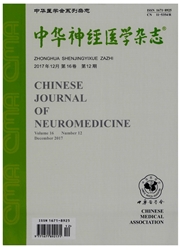

 中文摘要:
中文摘要:
目的通过观察脑胶质瘤中O6-甲基鸟嘌呤DNA甲基转移酶(MGMT)的表达状态,探讨MGMT在脑胶质瘤中的表达与替尼泊甙(VM-26)联合司莫司汀(Me-CCNU)方案化疗疗效之间的关系。方法对资料完整的47例经病理证实的脑胶质瘤患者进行回顾性研究,对患者的胶质瘤病理石蜡切片采用免疫组化法检测MGMT的表达,然后分析MGMT的表达与患者生存率之间关系。结果本组患者MGMT阳性表达率为40.4%。MGMT阴性表达组3年生存率为66.7%,平均总生存时间为(67.861±10.094)月;MGMT阳性表达组为52.6%,平均总生存时间为(47.263±7.983)月,比较差异均无统计学意义(P〉0.05)。11例患者出现I度的骨髓抑制现象,6例患者出现胃部不适、呕吐、腹泻、食欲不振等消化系统症状。结论VM-26联合Me-CCNU化疗方案可以有效克服脑胶质瘤中MGMT所带来的化疗耐药性问题,且该方案的毒副作用不大.是一个有效的化疗方案。
 英文摘要:
英文摘要:
Objective To study the relationship between O6-methylguanine-DNA- naethyltransferase (MGMT) expression in gliomas and the efficacy ofteniposide (VM-26) combined with semustine (Me-CCNU). Methods A retrospective chart review was performed on 47 patients diagnosed by pathology as having gliomas. The expression of MGMT in all paraffin sections of the patients were determined by immunohistochemical technique. The clinical efficacy was observed and the overall survival rates were analyzed. Results The positive rate of MGMT in all the 47 patients was 40.4%. Three-year survival rate of the negative group was 66.7% and that of the positive group was 52.6% without statistical significance (P〉0.05). The average OS of the negative group was 67.861 ± 10.094 and that of the positive group was 47.263±7.983 without statistical significance (P〉0.05). Bone marrow suppression of grade I was found in 11 patients with 6 appearing stomach discomfort, vomiting, diarrhea, loss of appetite and digestive symptoms. Conclusions MGMT is one agent of drug resistance of nitrosourea. VM-26 combined with Me-CCNU chemotherapy can overcome the resistance effect of MGMT with little side effects.
 同期刊论文项目
同期刊论文项目
 同项目期刊论文
同项目期刊论文
 Temporal changes in the level of neurotrophins in the spinal cord and associated precentral gyrus fo
Temporal changes in the level of neurotrophins in the spinal cord and associated precentral gyrus fo 期刊信息
期刊信息
